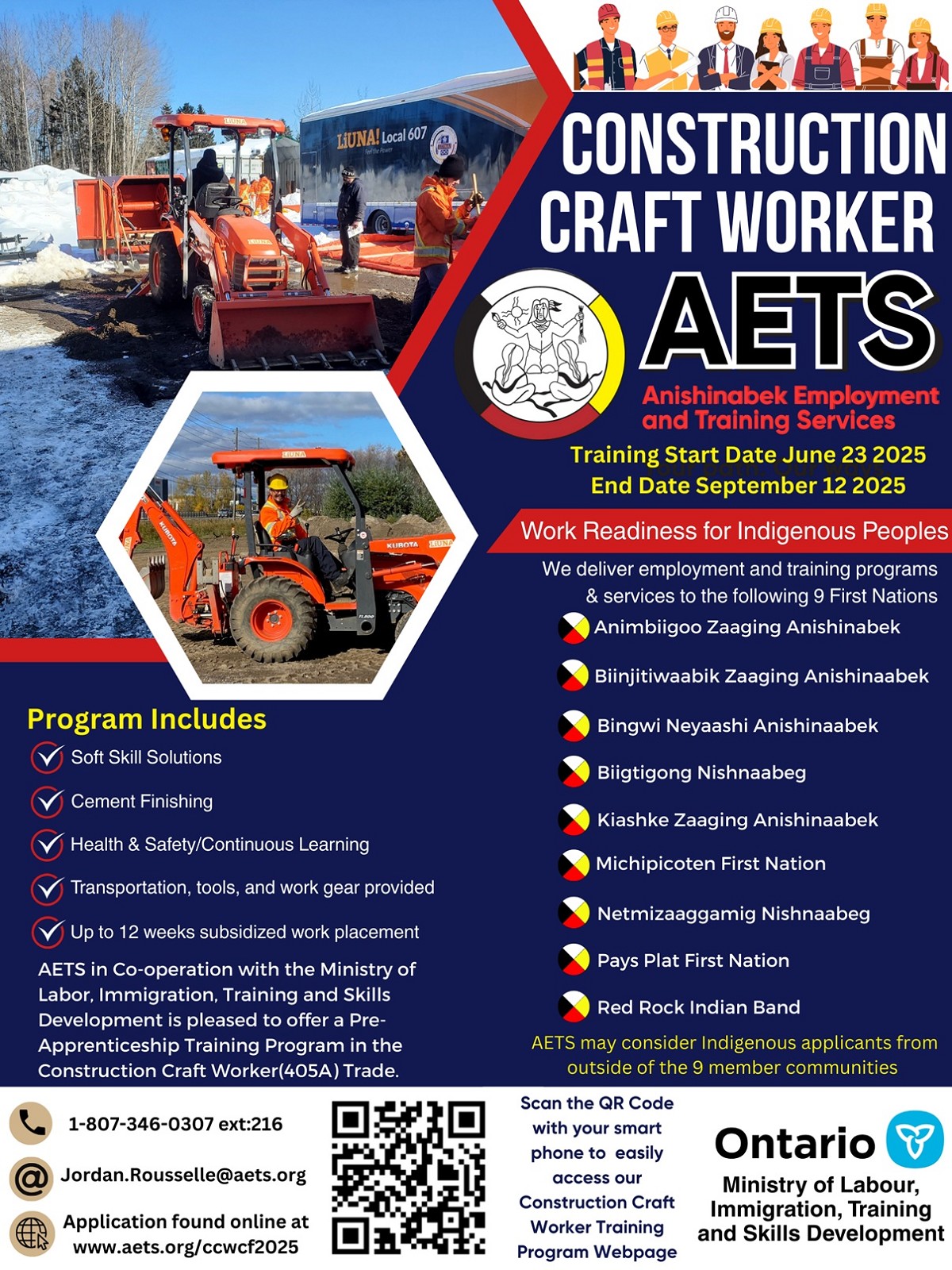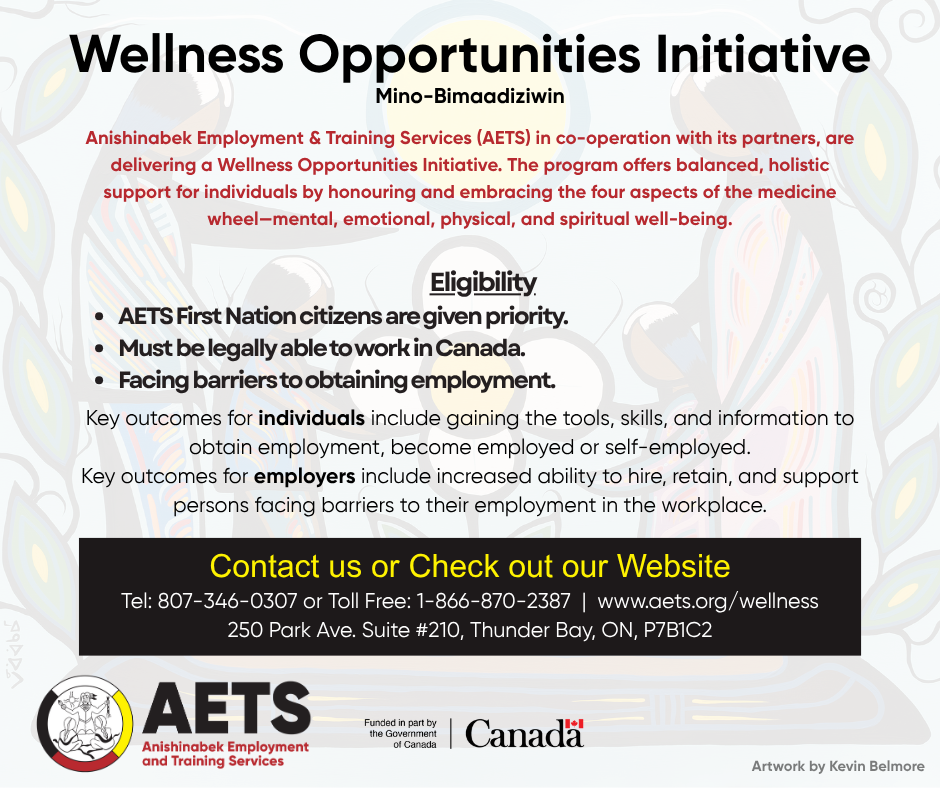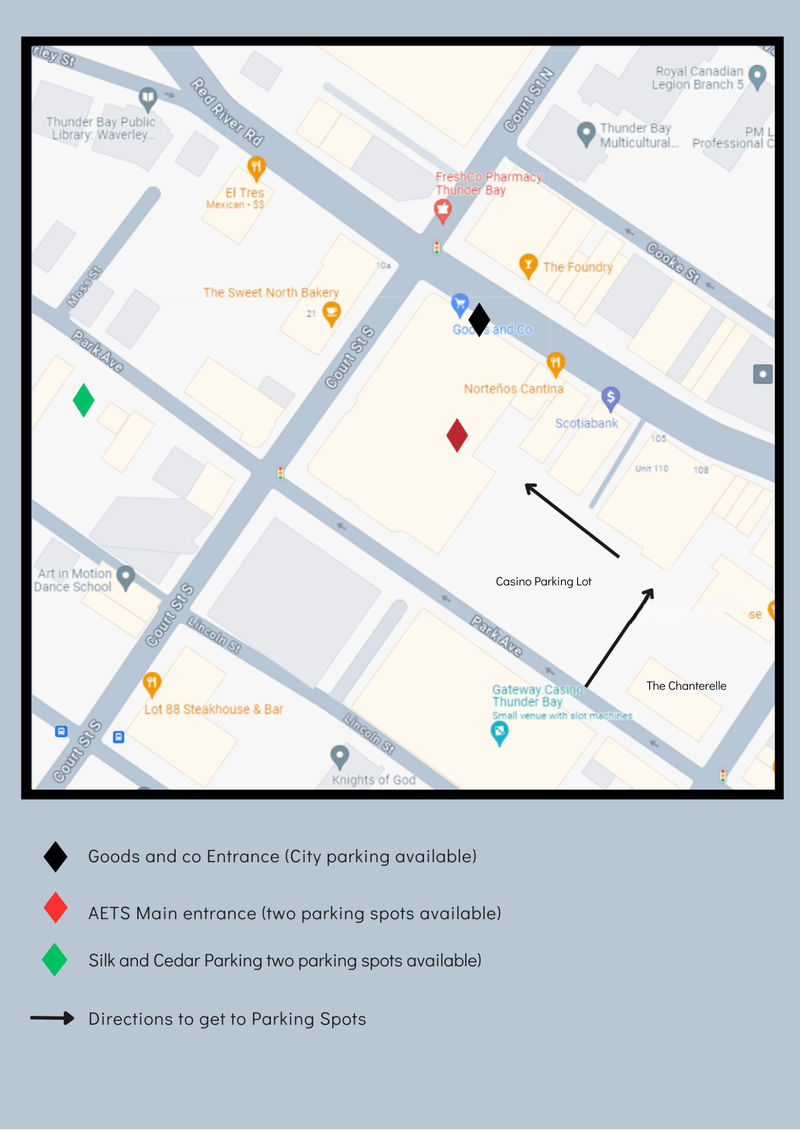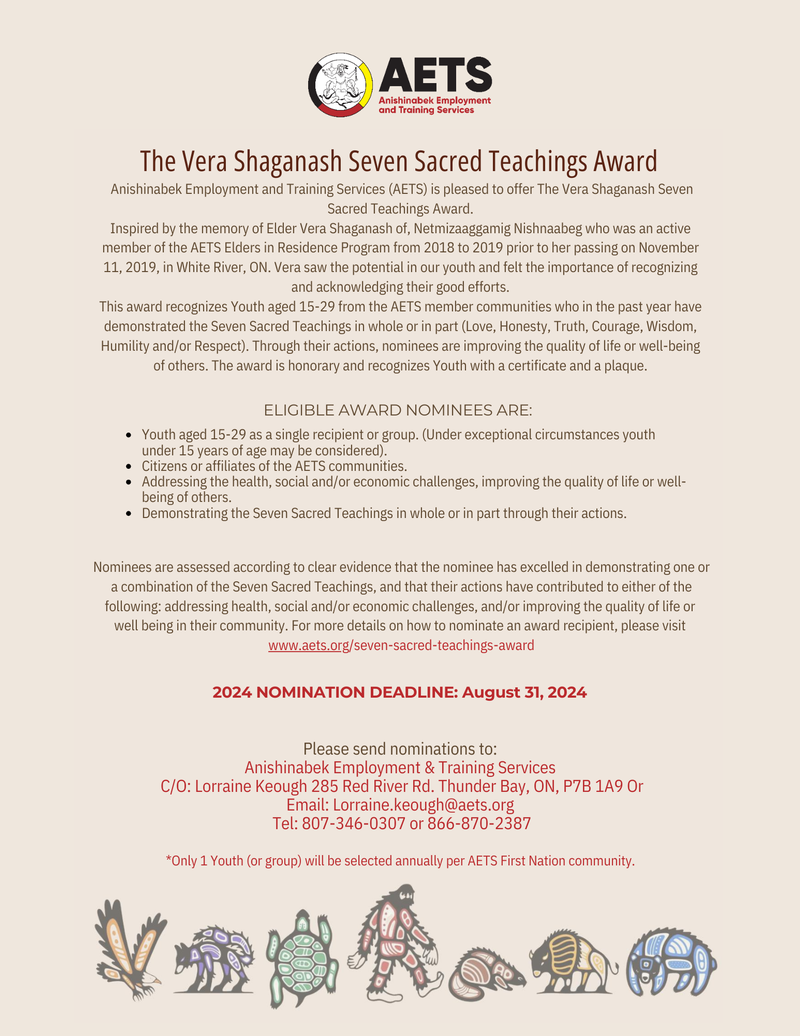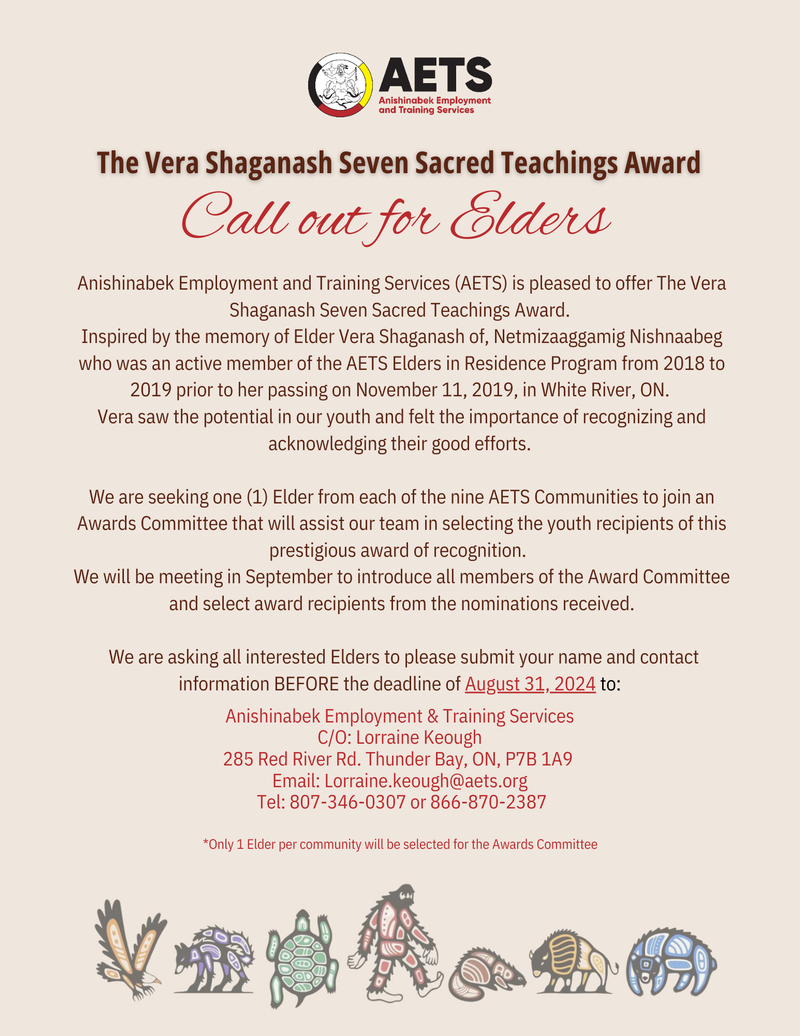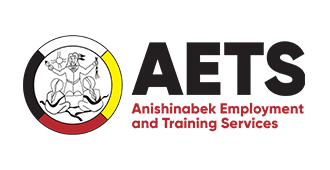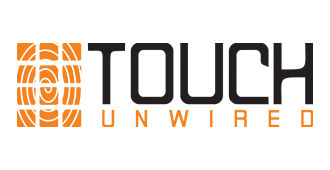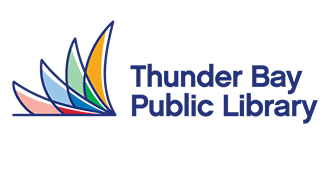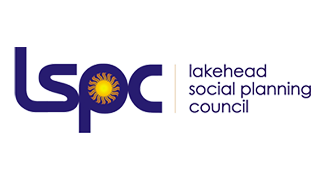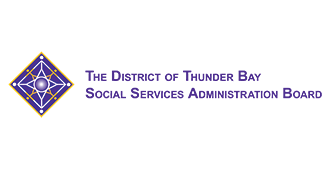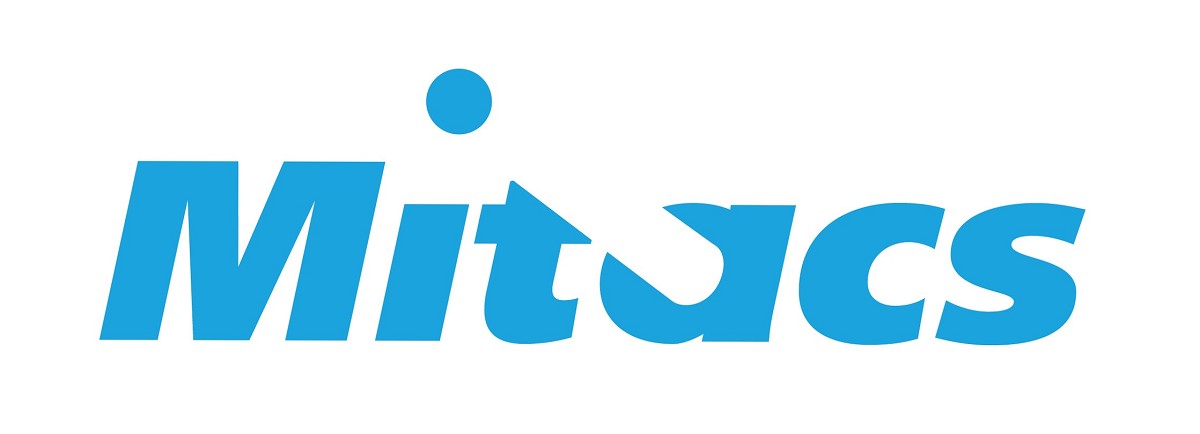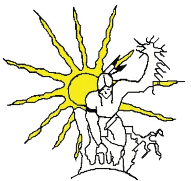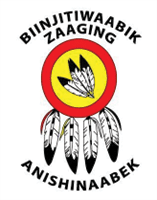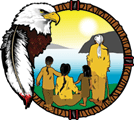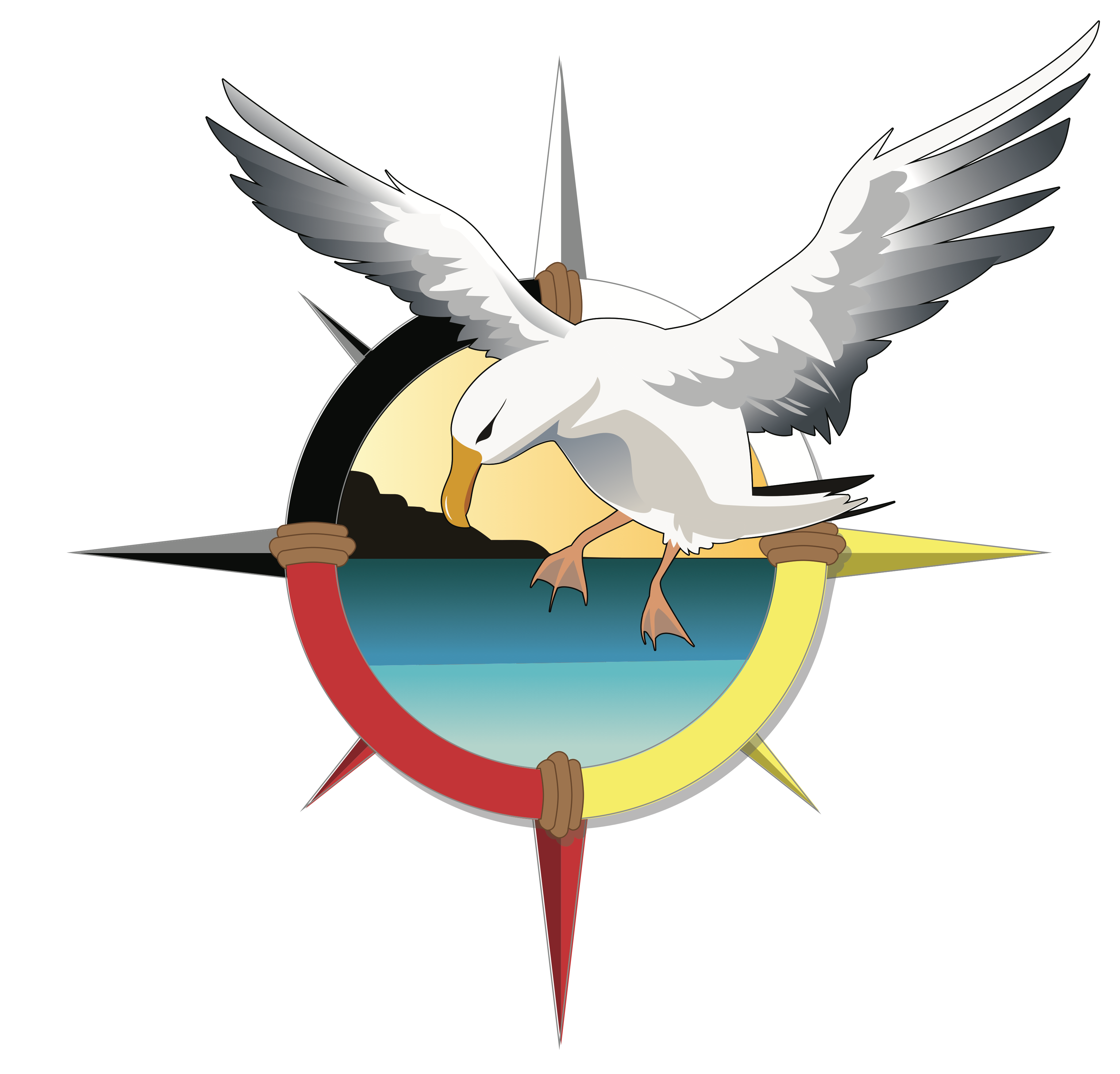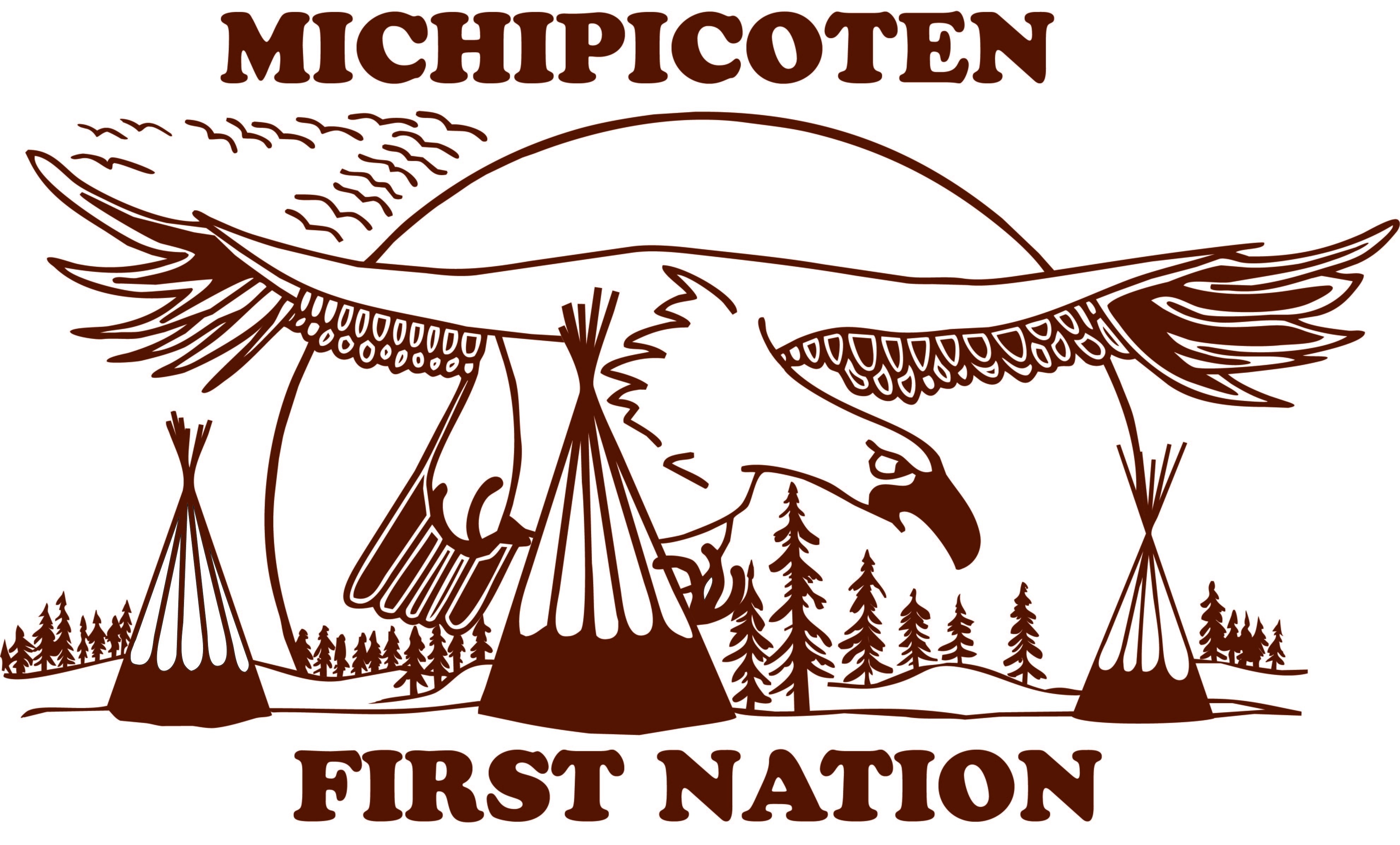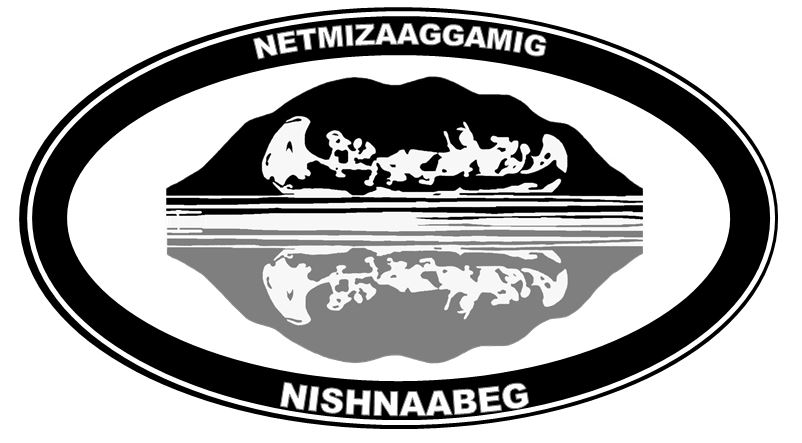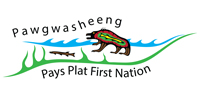Publications
Transportation Field Assistant
2025 Pre-Apprenticeship Training Program: Construction Craft Worker & Cement Finisher
Are you interested in gaining experience in the skilled trades? Contact us to inquire more about our Construction Craft Worker Training Program. We will be including Cement finishing as a secondary trade.
Resources:
Program Details:
- Orientation and Soft Skill Training - June 23rd to July 4th, 2025
- CCW/CF Training - July 7th - September 12th, 2025
Pre-requisite:
- High school diploma or high school transcript verifying grade 10 math
Application:
Construction Craft Worker & Cement Finisher Application
Application Deadline:
- Application deadline June 13th, 2025
For furthering questions & inquiries please contact:
Project Coordinator
(807) 346-0307 ext 216
Wellness Opportunities
Resources
- "Wellness" - Kevin Belmore - Meaning
-
Kevin Belmore is an Ojibwe artist from Kiashke Zaaging Anishinaabek (Gull Bay First Nation) currently living and painting in Thunder Bay, Ontario, Canada. Since 1989, Belmore has been painting in his iconic woodland style, taking inspiration from the four-season splendour of the Northwestern Ontario landscape animals, plants, and people who inhabit it.
-
- Wellness Poster
- Brochure
- Power Point Presentation
- Book an Appointment
- Workplace Without Limits Employers Conference Poster
- Workplace Without Limits Conference Agenda
- tools, skills and information to obtain employment;
- enhanced employability; and
- become employed, self-employed or have returned to school.
To support persons with disabilities prepare for, find and maintain employment or become self-employed, thereby increasing their economic participation and independence.
- increased ability to hire and support persons with disabilities in the workplace
- hire and retain persons with disabilities.
To assist employers, through a range of hands-on supports, to diversify their workplaces and to create inclusive and accessible work environments for employees with disabilities, assist those who support persons with disabilities in employment and employers that hire them by assisting them to increase their disability-related skills and capacities.
- Legally able to work in Canada
- AETS First Nation Citizen are given priority
- Disabled (Disability is defined as any developmental, intellectual, physical or other including addictions or mental health ).
Applications
Are open and ongoing and will include a scheduled appointment in Suite 210 at 250 Park Ave (behind Dilico Health Centre on Court Street).
AETS & Wellness Staff:
- Melanie Thompson, Program Coordinator
-
Melanie is a dedicated Program Coordinator based in Thunder Bay, Ontario. Drawing on her personal experiences and a strong background in prevention services, she brings a deep commitment to community-centered program development and Indigenous advocacy. She is a proud band member of Rocky Bay First Nation. In her role with Anishinabek Employment & Training Services, Melanie works to uplift the strengths of the 9 AETS communities by promoting wellness, supporting independent living, and fostering culturally grounded care. Her work is guided by empathy, respect, the Seven Grandfather Teachings, and a personal connection to Indigenous knowledge and practices. Melanie is passionate about creating safe, inclusive spaces where community voices are truly heard and valued. She strives to ensure that programs are responsive, empowering, and rooted in the unique strengths of each individual and community she serves.
-
- Bev Hunsberger, Employment Advisor
-
Bev moved to Thunder Bay in 2014 after falling in love with the land, the lake, and the people during her time at Lakehead University. Bev's experience includes retail management, volunteer management, running a small business, and the lived experience of being an employee with a disability. Bev has degrees in History and Indigenous Learning from Lakehead University and recently completed the Onajigawin Indigenous Services program at Confederation College. Bev is dedicated to meeting people where they are at, using a strength-based, holistic approach to relationships and healing and is passionate about assisting people in finding meaningful and sustainable employment.
-
- Kallie Milani, Job Developer
-
Kallie Milani is a Job Developer with the Wellness Initiative at Anishinabek Employment & Training Services (AETS). Working under the direction of the Wellness Community Coordinator, Kallie leads Job Development activities, building strong relationships with employers and leads employer engagement across AETS's nine First Nation communities, fostering meaningful employment opportunities and strong community partnerships. Kallie is committed to creating supportive, culturally respectful pathways that help individuals reach their career goals.
-
- Vacant, Life Skills Officer
Hours of operation and parking:
Monday to Friday 8:30 - 4:30 for walk ins, suite 210 at Park Ave
-
- Monday to Tuesday:
- Call 807-698-5611 to enter 251 Red River Road wheel chair accessible door access or 250 Park Avenue rear AETS door
- Wednesday through Friday:
- Call 807-698-5611 to enter 251 Red River Road wheel chair accessible door access or 250 Park Avenue rear AETS door,
- or enter 251 Red River Road wheel accessible door access at 11 am
- Monday to Tuesday:
- Free Parking at:
- 250 Park Avenue outside rear AETS door, in 2 marked AETS Parking Spots
- Parking Lot next to Silk & Cedar (275 Park Avenue), in 2 marked AETS Parking Spots
Community Resources:
-
Mental Health Support
-
- Call 211 or visit the 211 North Website
- Call ConnexOntario at 1-866-531-2600 or visit the ConnexOntario website
- See below for supports and services in Thunder Bay and District
-
-
Disclaimer
AETS does not provide acute crisis or mental health services or counselling. If you or someone you know is experiencing a mental health crisis:
- Call 911
- Call the suicide crisis helpline at 988 for calls and texts in both English and French, 24/7.
- Visit your nearest emergency department
- (807) 684-6100 (in Thunder Bay)
- Contact Crisis Response
- Thunder Bay: Call or text 807-346-8282
- District of Thunder Bay: 1-866 888 8988
Never be afraid to reach out for help. Remember, seeking help is a sign of strength. You don't have to face your struggles alone. There is support nearby with the following Indigenous Focused programs:
Crisis
- Beendigen Women's Crisis Home
- Crisis Home
- The crisis home, open 24/7, provides emergency shelter for women and children who require safe accommodations and are seeking refuge from abuse
- (807) 346-HELP (4357) or Toll Free: 1-888-200-9997
- Crisis Home
Counselling
- Dilico Anishinabek Family Care
- Walk-in counselling available in Thunder Bay, Tuesdays 1pm to 7pm
- (807) 624-5818
- Walk-in counselling available in Longlac, last Monday of each month from 1pm to 3pm
- (855) 623-8511 - Contact local Dilico office for clinic times and locations in the district
- Walk-in counselling available in Thunder Bay, Tuesdays 1pm to 7pm
Programming
- Provides support and programs to women and their children who have experienced abuse with the incorporation of the Seven Grandfather Teachings.
- (807) 622-1121
Thunder Bay Indigenous Friendship Centre
- Wide range of programming offered to support health and wellness across the lifespan. Open to clients by appointment only during COVID-19.
- (807) 345-5840
- Variety of programming offered to people across the lifespan for improved health and wellbeing
- Geraldton: (807) 854-1060
Ontario Native Women's Association
- Programming and support offered to Indigenous women (regardless of status)
- Fort William First Nation head office: (807) 623-3442, Toll-Free: 1-800-667-0816
- Thunder Bay office: (807) 623-3442, Toll-Free: 1-800-667-0816
- The Biidaaban Healing Lodge is a 12 unit facility that provides the Aboriginal population in the Robinson-Superior Area with Residential and Community-based Programming.
- (807) 229-3592 or Toll-Free: 1-888-432-7102
- Provide culturally safe, comprehensive care and helps empower patients through their health and wellness journeys
- Services include: Maternal Wellness Programs, EarlyON Centre, Youth Mental Health, Healthy Eating and Active Living
- Monday to Friday 8:30am – 4:30 pm
- Phone (807) 623-0383
Dilico Anishinabek Family Care
- Walk-in counselling available in Longlac, Nipigon, Mobert, Thunder Bay, Whitesand
- Toll free: (855) 623-8511
- Call or click above for clinic times
Addictions
Ka-na-chi-hih Specialized Solvent Abuse Treatment Centre
- Substance use residential treatment centre for First Nation youth aged 18-30. Offering services such as intake, referral, aftercare, and support.
- (807) 623-5577 or Toll-Free: 1-888-863-1560
Online/Over the Phone Support
- Hope for Wellness Helpline offers free phone or online chatting support 24/7 to all Indigenous people across Canada from experienced and culturally competent counsellors
- Chat lines are available in English and French and telephone support can be made available in Cree, Ojibway (Anishinaabemowin), and Inuktitut). *Please note: Supports in Cree, Ojibway, and Inuktitut are not available 24/7, so you may need to call in to find out the next time that a language-speaker will be available.*
- You can chat with them online by visiting the link above or call them at 1-855-242-3310
- Culturally grounded, confidential helpline, for Indigenous women (available in 14 languages) offered 24/7
- Call or Text: 1-855-554-HEAL
- Live chat option available on website
Funding for the initiative is provided by Employment and Social Development Canada through the Opportunities Fund for Persons with Disabilities.
Continuing Education Options
Education Course (Grade 11 Interdisciplinary Studies)
Labour Market Survey
ON-Reserve Survey
Education Systems Evolution

VISION
Our vision is to collaborate and develop, prototype, and measure the impacts of the education to employment system, and how specific contributing factors within those systems pose as a primary barrier to high school graduation rates and employment opportunities for Indigenous youth ages 15-25 years.
Once impacts are determined, it is imperative to focus on providing youth with the guidance and resources necessary to overcome challenges, complete their high school education, and help them embark on a path towards a successful future. This will be done by deeply rooting and continuously integrating Anishinaabe values and culture throughout their development. We aim to nurture their personal growth while preserving their cultural heritage.
Our vision extends beyond high school graduation to encompass comprehensive support for youth, including access to meaningful employment opportunities and continuous professional development. By facilitating connections between youth and the working world, youth will then apply their cultural knowledge, skills, and perspectives, empowering them to achieve their career aspirations while maintaining a strong connection to their ancestral traditions.
CURRENT PRIMARY COLLABORATORS
The six-year innovation involves the essential participation of the following individuals, groups, and organizations under the below governance model framework, to enhance the 60% non-graduation rates and future employment prospects of Anishinaabe youth served in the nine First Nation communities of AETS:

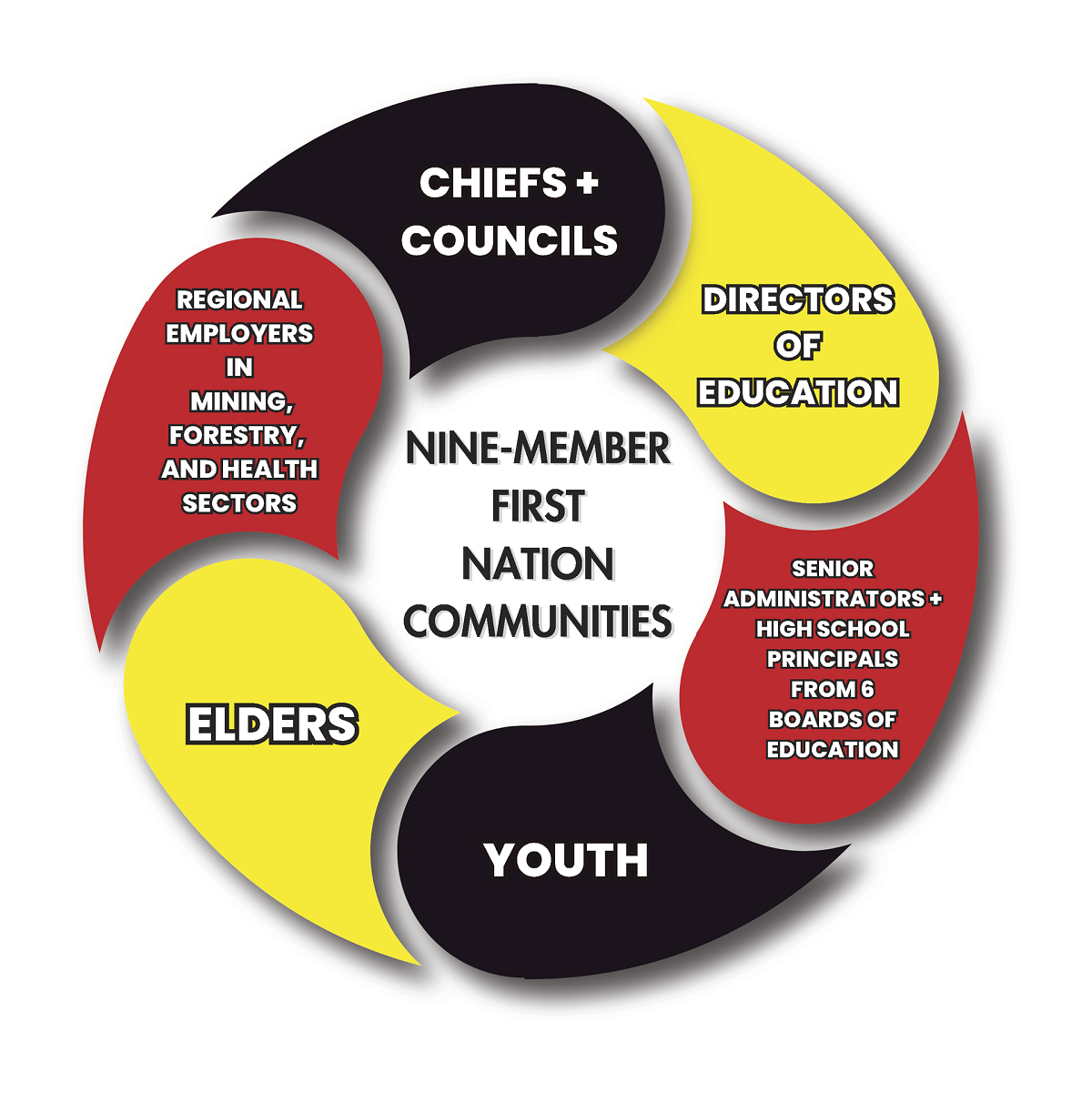
STRATEGIES
A fundamental shift is required to meet the needs of Anishinaabe youth and is necessary to change the education-to-employment system into one that is supportive, accessible, and engaging. The collaborators involved will assist and support the youth by integrating the following strategies for the remainder of the project:
 Engage 15–18-year-old youth currently enrolled high school students in a process of consultation and decision of how they want teachers to work with them
Engage 15–18-year-old youth currently enrolled high school students in a process of consultation and decision of how they want teachers to work with them Engage 19–25-year-old youth who left high school without a diploma in a process of consultation for a re-entry summer employment program including credit earning opportunities and skills development
Engage 19–25-year-old youth who left high school without a diploma in a process of consultation for a re-entry summer employment program including credit earning opportunities and skills development Develop and deliver a plan with affiliated communities, high schools, and teachers
Develop and deliver a plan with affiliated communities, high schools, and teachers Integrate exposures and opportunities to explore future employment, employment training, and future education possibilities
Integrate exposures and opportunities to explore future employment, employment training, and future education possibilities
Empowering Indigenous youth to assume leadership roles and take ownership of their educational and employment pathways to success holds immense significance. Their unique perspectives, cultural knowledge, and connection to their lands are vital in shaping inclusive systems that meet their needs. By assuming responsibility, Indigenous youth inspire future generations, foster self-determination, and empower their communities. We can recognize them as:

LAYING THE GROUNDWORK
In the beginning two years of the innovation, recognizing the vital importance of laying the groundwork and involving all collaborators, including stakeholders, youth, and the communities served, becomes the cornerstone for accurately assessing and executing the project plan. This initial collaborative effort ensures a comprehensive understanding of the youth's needs, enabling the development of a tailored plan that addresses those needs effectively.
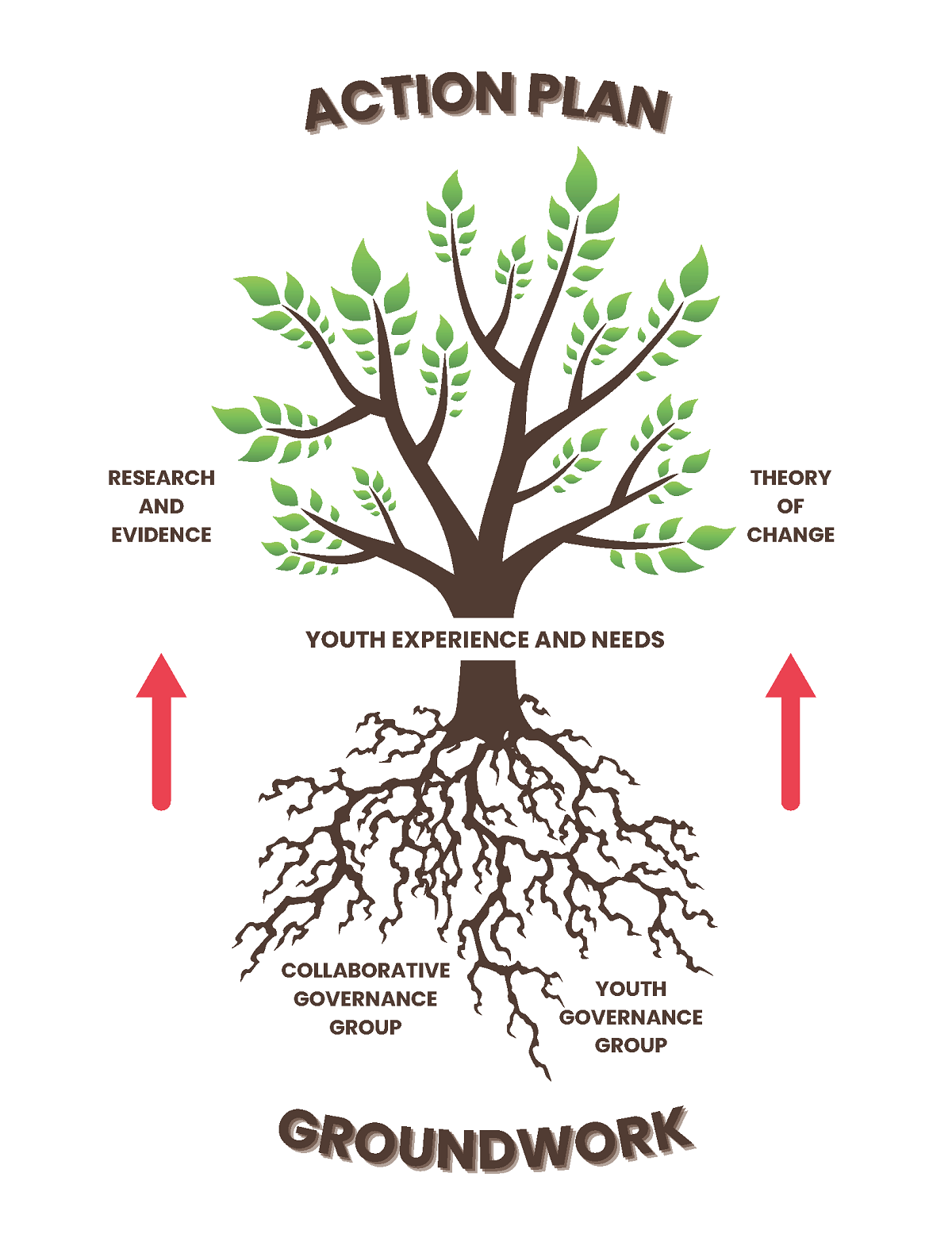
LOOKING AHEAD
Now the groundwork has been established, a crucial next step involves examining the compiled and analyzed data, along with the recommendations and perspectives gathered from the youth and their communities. This valuable information will be shared and deliberated amongst collaborators and will then serve as the basis for identifying pathways connecting education and employment opportunities for the youth involved. Using this data, collaborators will develop a tailored action plan that will be implemented in select schoolboards to improve both on and off-reserve graduation rates of Indigenous youths. Research will continue to monitor the success of these innovations, so we can make accurate recommendations with proven results.
This initiative will provide various opportunities and benefits for youth and their respective communities:
- Capacity development of a representative group of First Nation high school students
- Capacity development of a representative group of First Nation youth that have left high school before completing an OSSD
- Summer employment opportunities connected to key business and industry sectors in the territory
- The professional development of high school educators (working with students between grades 9 through 12)
- Formative and summative research that gathers evidence of improved high school graduation and employment outcomes
STEPS TAKEN
- Compiled groundwork data and use it to create frameworks that will support Indigenous youths in education and employment.
- Testing policies, procedures, and strategies that support Indigenous youths in employment and retention.
- Arrange meetings with school boards to begin implementation of the education framework.
- Work with employers to implement more inclusive hiring practices, as well as internal policies/procedures that are more supportive/understanding of the needs of community members. The ultimate goal is to improve the retention of Indigenous youths in the workplace.
Anishinabek Employment & Training Services (AETS)
AETS is a not-for-profit organization that provides project-based and workplace-based training to support the education-to-training and employment needs of on-and off-reserve members of nine Anishinabek communities in North Superior Treaty Region of Ontario. AETS is part of a national wide agreement with the Indigenous Skills Employment and Training (ISET), and one of the 110 distinct based Program Agreement Holders in Canada and one of 22 in Ontario.
Maamaawisiiwin Education Research Centre (MERC) - Initial Contracted Research Completed
MERC brings over 20 years of Indigenous community development, research, and in-service teacher education experience specific to the North Superior Treaty Region to the collaboration.
Endzhi-Gkinoohmaading
Operating in Pic River First Nation, Endzhi-gkinoohmaading Private High School is a First Nation, private high school that meets the regulatory requirements of a high school within the province of Ontario. Endzhi-gkinoohmaading brings a significant experience in distance education of First Nation youth and has a long collaborative history with AETS.
Lakehead Public Schools
Lakehead has become a territorial leader in Indigenous education by developing unique programming and partnering with Indigenous organizations in an effort to increase the school success of Indigenous youth. Almost 50% of the overall student body has self-identified as Indigenous and many of the AETS community members living in Thunder Bay attend Lakehead schools.
Superior-Greenstone District School Board
Superior-Greenstone provides quality education in a region known for its outdoor education experiences. The board coveris a vast area of 45,100 square kilometres and is responsible for providing public education to the communities of Beardmore, Geraldton, Longlac, Nakina, Caramat, Dorion, Nipigon, Red Rock, Schreiber, Terrace Bay, Marathon and Manitouwadge. The school board holds a number of Education Service Agreements with several area First Nation Communities, and it serves many of the AETS community members living on-reserve or nearby those communities.
Outland Youth Employment Program (OYEP)
For over 20 years, Outland has operated the Outland Youth Employment Program (OYEP), a national, six-week, land-based job training, education and work experience program specifically developed for Indigenous youth. OYEP is a First Nation driven initiative that works towards equity and opportunity through education, training and work experience that fully immerses Indigenous youth in a land-based learning environment.
Indigenous Works
For over 20 years, Indigenous Works is a national player working with companies to strengthen performance and results in Indigenous employment, workplace engagement and inclusion. AETS will continue to partner with Indigenous Works to provide project-related services to local business and industry partners.
Northern Ontario Education Leaders (NOEL)
NOEL is an association of leaders of educational organizations in Northwestern Ontario. The NOEL table serves as a forum to discuss topics of common concern and to develop projects that will be of direct benefit to students. In October of 2022, NOEL directors and standing members, as well as school boards affiliated with AETS communities, were able to meet with AETS and be informed of the land-based Systems Innovation initiative.
Community Economic Development Commission (CEDC)
The CEDC played a significant role as a key contributor and partial financier of the "Fundamentals of Land-Based Learning Conference," organized by AETS and Biigtigong Nishnaabeg in November 2022. Moving forward, AETS and CEDC intend to sustain their collaborative partnership to further explore project-oriented goals.
Roots Community Food Centre
Roots to Harvest and AETS are actively collaborating to help with alternative educational initiatives aimed at Indigenous youth who have left the formal education system prematurely. The Cooking for Cred program runs multiple sessions each year for adult learners 18-30 years old who want to gain some culinary skills from some of Thunder Bay's most talented chefs. The 7-week program includes workshops on making soup stocks, sauces, baking, roasting, carving and more. Everyone has the ability to obtain their safe food handling certification as well. AETS also provides support for childcare, transportation, and a completion stipend.
Fort William First Nation (FWFN)
Fort William First Nation actively engaged with AETS by hosting the Fundamentals of Land-Based Learning Conference in November 2022. Additionally, FWFN partnered with AETS in a significant project centered around moose hide tanning for the Continuing Education program. This collaboration allowed community members to explore traditional practices while also pursuing educational objectives. Furthermore, the collaboration provided AETS with the opportunity to test and experiment with updated strategies to support Indigenous youths in the classroom. FWFN remains committed to the project's objectives and will continue to support and engage in other future initiatives that promote cultural preservation and educational opportunities.
Systems Innovation Industry Partners Meeting - July 4 2024
AETS Systems Innovation Project Presentation
Systems Innovation Gathering Perspectives Event - April 20 & 21 2024
AETS - Systems Innovation Project
MERC - Improving High School Graduation Rates & Future Employment Outcomes
Systems Innovation Education Sharing Circles Event - January 25 & 26 2024
AETS - Systems Innovation Project Presentation
Helping Students Achieve Success - with Lisa Michano-Courchene
OYEP - Outland Youth Employment Program - with Dave Bradley, Mark Kmill, and Megan Jourdain
Integration of Land-Based Learning in the Provincial Education System - with Darren Lentz
Expanding Indigenous Knowledge Throughout Academia - with Raven Linklater
Live Graphic Recordings by Tanya Gerber
MERC - Improving High School Graduation Rates & Future Employment Outcomes for Anishinaabe Youth in Northwestern Ontario
Understanding the Roots to Healing and Wellness in Education - with Ron Kanutski
Systems Innovation Youth Sharing Circle Event - November 14 & 15 2023
AETS - Systems Innovation Project Presentation
Biigtigong Nishnaabeg Endzhi-gkinoohmaading Elementary School Curriculum Guidelines
Fundamentals of Land Based Learning Conference - November 10 & 11 2022
Changes in organizations
The system change aims to improve First Nation education, training, and employment by understanding the underlying reasons for their low success rates. Currently, there is an unspoken belief that First Nations are to blame for their own shortcomings that are shaped by the effects of colonialism. To shift this understanding, organizations and the collaborative need more knowledge about the actual reasons. The change will take time but should be established by the end of the second year, potentially offering more experiential learning options for Indigenous youth.
Changes in the collaborative
The current and potential collaborative group includes partners who have limited positive experience working with First Nations. This perception stems from conflicting visions of the future. However, there are successful instances of businesses and industries partnering with First Nations, driven by mutual respect, trust, and transparency. This innovation aims to foster gradual change and solidify by the end of the second groundwork year.
Changes in how the system functions
Education Units in smaller First Nations communities often face isolation and marginalization within the education system. The innovation addresses this by uniting them under a shared vision, employing an Anishinaabe-inspired method. This approach fosters capacity building and opens up possibilities for change within the current education system. The change encompasses both professional and cultural development, leading to a more educated group. Although gradual, the transformation is expected to be firmly established by the end of the second groundwork year.
Changes in how youth experience the system
Indigenous youth 15-18 years currently attending high school:
The current education approach treats students as passive recipients of knowledge, lacking choices, control, or input. This innovation shifts that by involving youth as active participants and agents of change. It may face resistance from some schools, but this is expected during the process of change. It will take time, patience, and persistence to see the transformation through. The change will happen gradually but should be firmly established by the end of the second groundwork year.
Indigenous youth 19 to 25-years of age who have dropped out of high school without a diploma:
Among the two youth groups, the older demographic will likely suffer the most emotional damage. They have faced educational setbacks, unemployment, and a significant number of them may struggle with substance abuse. The healing of this group depends on their active participation in the groundwork process and ongoing governance involvement. The change will happen when they can connect their experiences with research and achieve success through the innovation they contributed to. Although gradual, the transformation should be firmly established by the end of the second groundwork year.
Project Timeline Graphic - 2023 to 2024
Project Timeline Graphic - 2024 to 2026
After laying the groundwork foundation, the subsequent phase of the innovation involves embarking on the remaining years of the system change strategy. The progression begins with the execution and provision of a six-week summer employment program for 2025, 2026, and 2027, arranged by AETS and OYEP, where students will actively partake in a land-based experiences and provide feedback on employment policies, procedures, and practices.
Next, the contracted researcher and AETS will develop formative and summative research observed from the six-week land-based program.
From there, teacher recruitment will begin and engaged teachers from the participating high schools will then participate in a Professional Teacher Development framework designed by the researcher. Individual meetings will be held, and the in-class observations will be organized and executed.
Following the observation period, a Talking Circle or other event will be organized, facilitating a dialogue between teachers and youth. The AETS Researcher will compile, tabulate, analyze, and finalize a comprehensive report encompassing the Teacher Development Program & Summer Land Based Experience Program. Any required adjustments for the upcoming year will be implemented accordingly.
Seven Sacred Teachings Award
Anishinabek Employment & Training Services is pleased to offer The Vera Shaganash Seven Sacred Teachings Award. Inspired by the memory of Elder Vera Shaganash of Netmizaaggamig Nishnaabeg, who was an active member of the AETS Elder In-Residence Program from 2018-2019 prior to her passing on November 11, 2019, in White River ON. Vera saw the potential in our youth and felt the importance of recognizing and acknowledging their good efforts.
Award Committee
We are seeking one (1) Elder from each of the nine AETS Communities to join an Awards Committee that will assist our team in selecting the youth recipients of this prestigious award of recognition. We will be meeting in September to introduce all members of the Award Committee and select award recipients from the nominations received.
Forms
Media
Cell Phone Path to Employment

Project StartsNOW! |
Mobile Phones10 |
For AETSCLIENTS |
From getting a phone to finding a job, learn how to apply by clicking
Apply! |
What do you need to do before and during the project?
Prepare
|
Process
|
Phone
|
How to Apply?
Step 1: Prepare by completing and submitting the Eligibility Checklist Form.
Please complete and submit the Eligibility Checklist Form to AETS. Click here to find the Eligibility Checklist Form. Please submit the completed form to AETS at aets@aets.org . A formal Application Review of the submitted eligibility forms will be completed within one week of a submission, which may include verification with the Thunder Bay Social Services Administration Board. If approved by AETS, you could start Step 2.
Step 2: As part of the process, complete and submit the following Client Registration Form and two Agreements.
After being notified by an AETS Officer, please complete and submit the following documents:
- Client Registration Form: Click here to find Client Registration Form
- Job Seekers Club Agreement: Click here to find Job Seekers Club Agreement
- Cell Phone Loan Agreement: Click here to find Cell Phone Loan Agreement
- Thunder Bay Public Library Card Application: Click here to find Library Card Application, which you can use in the AETS Office for accessing computer workstations and more.
- With a free Thunder Bay Public Library Card, you gain access to all the offerings of the Thunder Bay Public Library. It includes over 3,334 eMagazine titles through the Libby app. Checkout as many titles as you want with no holds or restrictions. Unlimited renewals mean you can keep them as long as you'd like. eMagazines are downloaded automatically for your convenience enabling offline reading. Click here for more information.
Please submit the completed form to the applicable AETS Lead Officer and Systems Officer, who will process the forms along with a free co-branded Thunder Bay Public Library & AETS library card and work with the Job Seeker to ensure the Cell Phone is ready for pick up and escorted to the TBPL for pick up arrangements.
Step 3: Phone service activation.
How Does the Project Work?
AETS will provide cell phone service activation (including 500 free daytime minutes* and other below referenced provisions) with an approved Job Seeker, in co-operation with Touch Unwired and tbaytel. The Thunder Bay Public Library - Waverley Community Hub will store and loan out each of the cellular phones, upon receipt of the completed Cell Phone Loan Agreement with the assistance of the AETS Officer. The following is part of the expectations of the AETS Job Seeker recieving a cell phone:
- Weekly follow up with AETS Officer
- Bi-weekly surveys
- Utilize the Employer Tracking Form as required
- Review task reminders
- Return cell phone at the end of the up to 3 month loan agreement.
- * Approved clients on this project, are responsible for paying any overages.
Monitoring
AETS's applicable Officer will be monitoring the Job Seekers utilization of this project, based on the Job Seekers Club Agreement and utilization feedback.
Note: As this is a pilot project, it will be evaluated in Spring 2021 for purposes of determining an extension and/or expansion.
Mobile Phone Model and the tbaytel Package
What kind of mobile phone would I get?
The phone that will be used for this project is a 16GB iPhone SE, please click here to find more information about iPhone SE.
What services are included in the tbaytel package?
Calling minutes: Limited to 500 daytime minutes, after 6 pm and on weekends unlimited calling available.
Wi-Fi: Access to any tbaytel Wi-Fi hotspots thoughout the city to access data.
|
|
|
|
|
|
|
|
|
|
|

